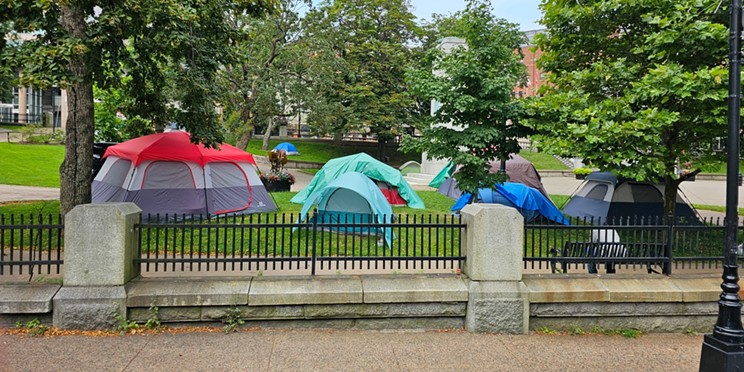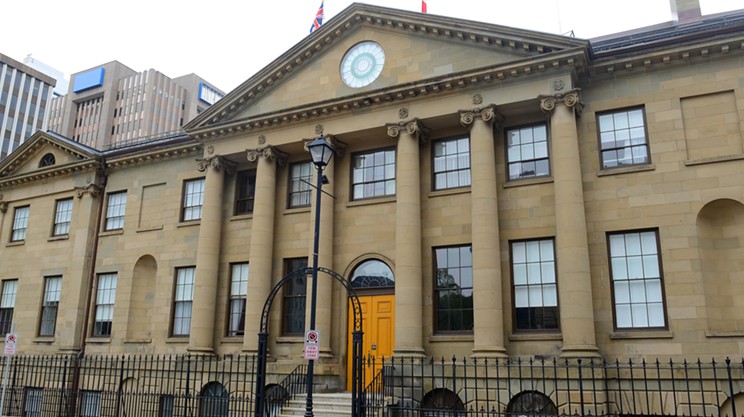Correction: Although two members of council are running for mayor in the October 19, 2024 election, the following story as originally published only mentioned the candidacy of one of them. That lack of full context has been fixed, and we sincerely apologize for the oversight. (August 8)
Councillor Pam Lovelace proposed a motion during Tuesday’s regular council meeting to strike Point Pleasant Park from Halifax’s list of proposed homeless encampment designations.
Citing a petition and emails from concerned residents, Lovelace, who is running for mayor in this fall's elections, argued the park should be removed from the “designated locations” list due to the potential for danger such as fires, which are not permitted in the park according to the city’s rules.
“Point Pleasant Park is a site for weddings. It’s a site for special events,” Lovelace said at the Aug. 6 meeting. “There are thousands of people that go to Point Pleasant Park regularly, and it’s a forest floor that’s composed of mostly of softwood, and it’s a forest floor that has an incredible amount of combustible materials that have gathered over time from hurricanes, tropical storms, ice storms and so on and so forth.”
While she admitted that the Department of Natural Resources and Renewables hasn’t performed a wildfire risk assessment in the park, Lovelace says its frequent use by residents and the lack of regulations around encampments in the city mean it shouldn’t be used for that purpose.
Waye Mason, the councillor whose district includes the park, was the first to speak against Lovelace’s motion. He pointed out that people are living in tents in undesignated spots as it is, including Point Pleasant.
“Once again, we’re back into talking about: Are we going to manage the fact that people live in tents right now because of the national housing crisis and the failure of all levels of government to provide adequate and safe housing, or are we going to pretend that by making empty motions today, or making empty statements on the internet, will change one thing at all,” said Mason, who is also running for mayor.
He went on to say that the only means the municipality has to deal with the current housing situation is whether they will manage tents or not. “If the answer’s no, there will still be tents in every one of these parks,” added Mason, calling Lovelace’s motion “word salad.”
A short-term solution
Councillors have described tenting in the city as a short-term solution, with Mason and councillor David Hendsbee in particular stating only restricted corners accessible by transit and the fire department will be designated for tenters. On July 9, council approved a list of nine potential encampment locations, including Point Pleasant, part of the Halifax Common and Bisset Road in Dartmouth. Later in the month, two of those proposed locations—Cogswell Park and the Geary Street green space—were officially opened for “sleeping rough,” joining the only other approved tenting areas: Barrington Street green space, Green Road Park, Lower Flinn Park and the University Avenue green space.
During debate on Tuesday about the proposed locations that remain on the city’s list, councillor Shawn Cleary, like others on council, pointed fingers at the province’s lack of sufficient work in creating temporary or affordable housing fast enough.
“The province has committed to creating new government-owned social housing,” said Cleary. “Not one unit has been built yet. The province committed to pallet shelters. Very few have been put up. So, guess where people are? On municipal land. Not in a house.”
Looking at the province’s record on attempting to resolve the housing crisis, it has only managed to start two pallet shelter communities: one in Lower Sackville with 19 shelters, and another in Kentville with 20 shelters. That’s a total of 39 shelters, when the province originally ordered 200 single-shelter units for $7.5 million, making the announcement in October 2023—nearly a year ago.
As for its five-year housing plan to create over 40,000 units provincewide, many of the projects that have been announced won’t be completed for years to come, with little-to-no construction having started.
Let’s also not forget the provincial government’s outright complacency, or perhaps willful disregard, of its own legislation allowing for renovictions, fixed-term leases and the lack of Residential Tenancies Act enforcement—all of which are in part responsible for putting people on the streets.
As some will remember, instead of detailing his government’s own failures, premier Tim Houston pointed fingers at the city last month for allowing homeless encampment designations in some public parks, saying he fell out of his chair in shock.
But as Cleary said at the meeting regarding homeless encampments in parks, it sucks, but there’s nothing more that can be done on the municipal side.
“Where else is the location you’re going to put people? Until you can come up with an alternative location, don’t do something as meaningless as this,” Cleary said of the motion to take the park off the list.
The motion to rescind the designation was ultimately defeated in an 8-6 vote, with even outgoing mayor Mike Savage’s vote to take Point Pleasant Park off the list coming up short. If the city does go forward and open the park, or any other of the proposed locations, to tenting, that will be a decision for another day.


